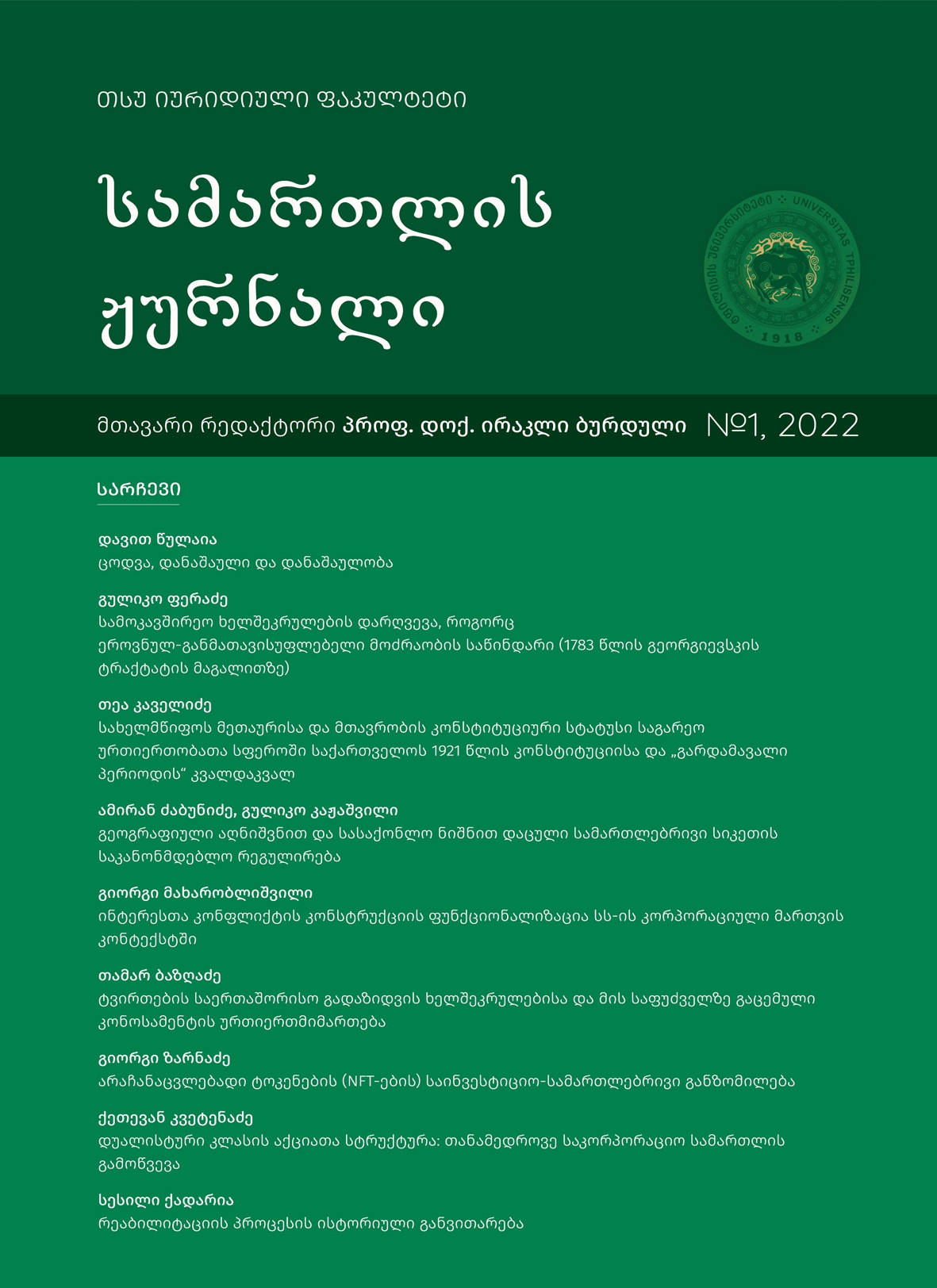ინტერესთა კონფლიქტის კონსტრუქციის ფუნქციონალიზაცია სს-ის კორპორაციული მართვის კონტექსტში
DOI:
https://doi.org/10.48614/jlaw.1.2022.4940საკვანძო სიტყვები:
ინტერესთა კონფლიქტი, ერთგულების მოვალეობა, კორპორაციული მართვა, საკუთარ თავთან დადებული გარიგება, დაინტერესებული პირი, დაკავშირებული პირი, ინფორმაციის გახსნილობა.ანოტაცია
სტატიაში გაანალიზებულია საკორპორაციო სამართლის ბირთვის, კორპორაციული მართვის მთავარი დილემის ძირითადი ვექტორი, რომელიც ინტერესთა და ვალდებულებათა კონფლიქტს მიემართება. საკორპორაციო სამართლის კონკრეტული მიზანი ორგანიზაციულად მოწყობილ სამეწარმეო საზოგადოებაში მონაწილე ან მასთან დაკავშირებულ პირთა შორის არსებულ ინტერესთა კონფლიქტის კონტროლირებადი სამართლებრივი არეალის შექმნაა. შეუთავსებელ ინტერესთა მქონე სუბიექტთა შორის დისბალანსის პრევენცია კორპორაციული მართვის სისტემური ნაწილია და მას „მფლობელ-მესაკუთრის“ პრობლემა ეწოდება.
საკუთრების და კონტროლის გამიჯვნა უფლებებს, მოვალეობებსა და ინტერესს შორის კოლიზიას წარმოშობს. ინტერესთა შორის კონფლიქტი არის რეალიზებადი პოტენციური საფრთხე, რომელიც გარიგებაში მონაწილე ერთი მხარისთვის, გარიგების მეორე მხარის ხარჯზე, არამართლზომიერი, პირადი მოტივით განპირობებული უპირატესობის მინიჭების შესაძლებლობას გულისხმობს. კორპორაციულსამართლებრივად, პოტენციური საფრთხე საინვესტიციო თუ ინვესტირებული კაპიტალის რისკად „ითარგმნება“, რისკში კი „რაღაცის დაკარგვის ალბათობა, გამოხატული პროცენტულ მაჩვენებელში“ მოიაზრება. არამართლზომიერი უპირატესობის ეკონომიკური შედეგია მატერიალური, ფინანსური ან სხვა სარგებლის მიღება.
ინტერესთა კონფლიქტის კონსტრუქცია ნორმატიულად მოწესრიგებადი ხასიათის პირობებში კორპორაციულსამართლებრივი დაცვის სტრატეგიად გარდაიქმნება. მისი შინაარსის კორპორაციულ სტრატეგიად გამოყენება სს-ის მიზნობრივად გამართული ფუნქციონირების გარანტია, ხოლო დავის წარმოშობის შემთხვევაში, სასამართლოსთვის მართლმსაჯულებითი ანალიზის ორიენტირის სწორად განსაზღვრის შესაძლებლობას წარმოსახავს. შედეგად, ინტერესთა კონფლიქტის საკანონმდებლო დონეზე მოწესრიგებადი კონსტრუქცია სს-ის ინტერესთა კონფლიქტის კონტროლირებად ბუფერს ქმნის.
წყაროები
A.L.I. Corporate Governance Project, §5.07.
Civil Code of Georgia, Departments of Parliament, 31, 24/07/1997 (in Georgian).
Company Act 2006.
Corporate Governance Code for Commercial Banks, SBA, IFC, 2009 (in Georgian).
Delaware General Corporation Law, § 144.
G20/OECD Principles of Corporate Governance, VI. The Responsibilities of the Board, 2015, 25-26, 37, 40, 45-46.
Law of Georgia on Entrepreneurs, Legislative Herald, 04/08/2021 (in Georgian).
Law of Georgia on the Securities Market, Departments of Parliament 1 (8), 24/12/1998 (in Georgian).
Order of the President of the National Bank of Georgia of September 26, 2018 215/04 "On the Approval of the Corporate Governance Code of Commercial Banks", Legislative Herald, 27/09/2018 (in Georgian).
Revised Model Business Corporation Act, 2021, § 8.60-8.62.
Allen T. W., Kraakman R., Subramanian G., Commentaries and Cases on the Law of Business Organization, 4th ed., Wolter Kluwer Law & Business, 2012, 26-29, 269-281, 276, 277, 278, 280-281, 282-283, 284, 292-294, 295-308.
Armory J., Hansman H., Krackman R., Pargendler M., What is corporate justice? In the collection: Anatomy of Corporate Law: Comparative and Functional Approach, (Translators) Kochiashvili A., Maisuradze D., (Ed.) Gabelia T., 3rd ed., Tbilisi, 2019, 22-26, 35 (in Georgian).
Bainbridge M. S., Shareholder Activism and Institutional Investors, Law and Economics Research Paper No. 05-20, 2005, 4-10.
Bakakuri N., Gelter M., Tsertsvadze L., Jugheli G., Corporate Law, Handbook for Lawyers, Tbilisi, 2019, 102-103, 103-106 (in Georgian).
Bazghadze T., Remuneration of the Director as a Prerequisite for Effective Corporate Governance on the Example of Experience from the Global Economic Crisis, in Collection: Collection of Corporate Law III, Burduli I. (ed.), Tbilisi, 2015, 119-151 (in Georgian).
Beridze T., Burduli I., Makharoblishvili G., Kharaishvili A., Sikharulidze D., Kikutadze V., Lobzhanidze N., The Impact of Soft Law on the Effectiveness of Corporate Governance, Tbilisi, 2018, 53-61, 91-92 (in Georgian).
Bloomfield J.r., Traditional vs. Behavioral Finance, Jonson School Research Paper Series No. 22-2010, 2010, 2-10.
Bratton W., Watcher L. M., Shareholder Primacy’s Corporatist Origins: Adolf Berle and The Modern Corporation, 34 J. Corp. L. 99, 2008, 118-122.
Brudney V., Chirelstein M. A., Cases and Materials on Corporate Finance, Foundation Press, 1979, 708-710.
Burduli I., Fundamentals of Share Law, Vol. I, Tbilisi, 2010, 126-127, 355-365 (in Georgian)
Burduli I., Fundamentals of Share Law, Vol. II, Tbilisi, 2013, 195-247, 360-370, 371, 432-441 (in Georgian).
Burduli I., Makharoblishvili G., Tokhadze A., Zubitashvili N., Aladashvili G., Magradze G., Egnatashvili D., Corporate Law, Tbilisi, 2021, 47-48, 78-81, 180-184, 186 (in Georgian).
Burduli I., Makharoblishvili G., Egnatashvili D., Ebanoidze T., Capital Market Functionality: The Existing Reality and the Necessity of Reform, Burduli I. (ed.), Tbilisi, 2017, 19-67 (in Georgian).
Cahn A., Donald D. C., Comparative Company Law, Text and Cases on the Laws Governing Corporations in Germany, the UK and the USA, Cambridge University Press, 2011, 335-337, 338, 341, 342, 343, 346, 419-427, 454-463.
Chanturia L., Commentary on the Civil Code, Book I, Chanturia L. (ed.), Tbilisi, 2017 (in Georgian)..
Chanturia L., Corporate Governance and the Responsibility of Managers in Corporate Law, Tbilisi, 2006, 181, 199-206, 321, 324, 325-326, 330, 341-350 (in Georgian)..
Chanturia L., Introduction to the General Part of Georgian Civil Law, Tbilisi, 2000, 238-241 (in Georgian).
Coffee Jr. J., C., The Rise of Dispersed Ownership: The Role of in the Separation of Ownership and Control, Columbia Law School, Working Paper No. 182, 2001, 24-37.
Cox J. D., Hazen T. L., The Law of Corporations, Vol. 2, 3rd ed., St. Paul, 2010, 184, 186, 187, 189, 190, 194, 196, 197-198, 199, 201, 204-205, 210-213, 217-222.
Davies P., Introduction to Company Law, 2nd ed., Oxford University Press, 2010, 110-111, 161, 162, 163-164, 166-167, 171-182.
Djibouti S., Modern Legal Problems of Protecting the Interests of Small Investors in the Capital Market and Ways to Solve Them, Tbilisi, 2016, 42-45 (in Georgian).
Eisenberg M., Self-Interested Transaction in Corporate Law, Journal of Corporate Law №13, 1988, 997-1008.
Enrique L., Hertig J., Kanda H., Pargendler M., Related party transactions, in the collection: Anatomy of Corporate Law: Comparative and Functional Approach, (Translators) Kochiashvili A., Maisuradze D. (ed.) Gabelia T., 3rd ed., Tbilisi, 2019, 223-232, 239-240, 243-247, 248, 249 (in Georgian).
French D., Mayson S., Ryan C., Company Law, 26th ed., Oxford University Press, 2010, 469, 491-492, 498, 499, 503, 505.
Gantchev N., Giannetti M., The Cost and Benefits of Shareholder Democracy: Gadflies and Low-Cost Activism, finance Working Paper №586/2018, 2020, 1-6.
Gevurtz F. A., Corporation Law, West Group, 2000, 321, 322, 325-331, 341-346, 351, 352, 353, 356, 357.
Gilson R., Controling Shareholders and Corporate Governance: Complication the Comparative Taxonomy, Law Working Paper №49/2005, 2005, 5-6.
Hopt K. J., The German Two-Tier Board: Experience, Theories, Reforms, in: Comparative Corporate Governance: The State of the Art and Emerging Research, (Edit.) Hopt K. J., Hideki K., Wymeersch R., Prigge S., Clarendon Press, 1998, 228.
Hopt K. J., The German Law and Experience with the Supervisory Board, Working Paper №305/2016, 2-3.
Jugheli G., Capital Protection in a Joint Stock Company, Tbilisi, 2016, 249 (in Georgian)..
Kikvadze G., Mandatory Tender Offer, in Collection: Collection of Corporate Law III, Burduli I. (ed.), Tbilisi, 2015, 60-66 (in Georgian).
Kiria A., Corporate Law System in Georgia, in Collection: Collection of Corporate Law I, Burduli I. (ed.), Tbilisi, 2011, 29-31 (in Georgian).
Klein A.W., Coffee C.J. JR., Business Organization and Finance, 11th ed., Foundation Press, 2011, 45-47, 243-245.
Makharoblishvili G., General Analysis of Corporate Governance, Tbilisi, 2015, 54-90, 58-59, 68-76, 80-81, 304-307. (in Georgian).
Makharoblishvili G., Implementation of fundamental changes in the structure of capital societies on the basis of corporate-legal actions (acquisition-merger), Tbilisi, 2014, 33, 34-42 (in Georgian).
Mortimore, (Edit) Company Directors Duties, Liabilities and Remedies, 2nd ed., Oxford University Press, 2013, 236.
Palmiter A. R., Corporations, Examples and Explanations, 5th ed., Aspen Publisher, 2006, 231, 232, 235, 236, 239-240, 241.
Pinto R.A., Understanding Corporate Law, 3rd ed., Lexisnexis, 2009, 241, 242, 243, 244, 252-254, 255.
Revised Model Business Corporation Act, 2021, § 8.60-8.62, Official Comment.
Robakidze S., Transactions and Private-Legal Consequences of Misuse of Insider Information, in Collection: Collection of Corporate Law I, Burduli I. (ed.), Tbilisi, 2011, 159-260, 226-255 (in Georgian).
Rusiashvili G., Aladashvili A., Commentary on the Civil Code, Book III, Chanturia L. (ed.), Tbilisi, 2019 (in Georgian).
Sharfman B. S., Shareholder Wealth Maximization and its Implementation Under Corporate Law, Florida Law Review, Vol. 66, 2014, 393-399.
Stout A.L., On the Proper Motives of Corporate Directors (or, Why You Don’t Want to Invite Homo Economicus to Join Your Board), UCLA School of Law, Research Paper No. 04-7, 2004, 1-3.
Tsertsvadze L., Duties of the Director in Merging the Company and Selling the Controlling Stake (Comparative-Legal Analysis on the Example of US, Predominantly Delaware, EU and Georgian Law), Tbilisi, 2015, 119-124, 125, 132-133 (in Georgian).
Williamson E.O., The Modern Corporation: Origin, Evolution, Attributes, Journal of Economic Literature, Vol. XIX, 1981, 1537-1546.
Zubitashvili N., The Doctrine of Corporate Opportunity in American and Georgian Law, TSU Journal of Law, №2, 2013, 44-56 (in Georgian).
Cookies Food Product v. Lakes Warehouse, 430 N.W. 2d 447 (Iowa 1988).
Rosenblatt v. Getty Oil Co., 493 A.2d 929 (Del. 1985).
Unocal Corp. v. Mesa Petroleum Co, 493 A.2d. 946 (Del. 1985).
Weinberger v. UOP Inc., 457 A. 2d. 701, 711 (Del. 1983).
Lewis v. S.L. & E., Inc., 629 F.2d. 764 (2d Cir. 1980).
Lewis v. Vogelstein, 699 A.2d 327 (Del. Ch. 1977).
Fliegler v. Lawrence 361 A.2d. 218 (Del. 1976).
Sinclair Oil Corp. v. Levien, 280 A.2d 717 (Del. 1971).
State Ex Rel. Hayes Oyster Co. v. Keypoint Oyster Co. 391 P.2d 979 (Wash. 1964).
ჩამოტვირთვები
გამოქვეყნებული
როგორ უნდა ციტირება
გამოცემა
სექცია
ლიცენზია

ეს ნამუშევარი ლიცენზირებულია Creative Commons Attribution-ShareAlike 4.0 საერთაშორისო ლიცენზიით .









